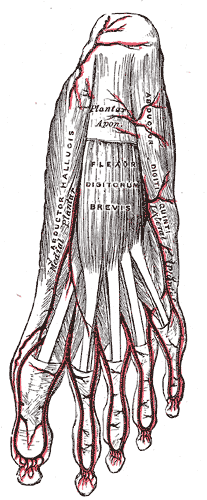Abductor digiti minimi muscle of foot
| Abductor digiti minimi muscle of foot | |
|---|---|
 First layer of the muscles of the sole (abductor digiti minimi visible at center right). | |
 Superficial view of the plantar arteries (abductor digiti minimi visible at center right). | |
| Details | |
| Origin | Plantar aponeurosis |
| Insertion | Fifth toe or phalanges |
| Artery | Lateral plantar artery |
| Nerve | Lateral plantar nerve |
| Actions | Flexion and abduction of the fifth toe |
| Antagonist | Flexor digiti minimi brevis muscle |
| Identifiers | |
| Latin | musculus abductor digiti minimi pedis |
| TA98 | A04.7.02.063 |
| TA2 | 2679 |
| FMA | 37451 |
| Anatomical terms of muscle | |
The abductor digiti minimi (abductor minimi digiti, abductor digiti quinti) is a muscle which lies along the lateral (outer) border of the foot,[1] and is in relation by its medial margin with the lateral plantar artery, vein and nerves.
Its homolog in the arm is the abductor digiti minimi muscle in the hand.
Origin and insertion
It arises, by a broad origin, from the lateral process of the tuberosity of the calcaneus, from the under surface of the calcaneus between the two processes of the tuberosity, from the forepart of the medial process, from the plantar aponeurosis, and from the intermuscular septum between it and the flexor digitorum brevis.[2]
Its tendon, after gliding over a smooth facet on the under surface of the base of the fifth metatarsal bone, is inserted, with the flexor digiti quinti brevis, into the fibular side of the base of the first phalanx of the fifth toe.[2]
Innervation
The abductor digiti minimi is innervated by the lateral plantar nerve, a branch of the tibial nerve.
Function
Its function is flexion[3] and abduction of the fifth (little) toe at the metatarsophalangeal joint.[2][3]
Clinical relevance
Due to its role in posture during all physical activity while in an upright position, the abductor digiti minimi is often the target of injury.[citation needed]
In case of polydactyly it may insert to the sixth toe instead, if there is one.[citation needed]
Etymology
The Latin name abductor digiti minimi translates to abductor of the small digit while the alternative name abductor digiti quinti means abductor of fifth digit.
Additional images
- Bones of the right foot seen from below.
References
![]() This article incorporates text in the public domain from page 492 of the 20th edition of Gray's Anatomy (1918).
This article incorporates text in the public domain from page 492 of the 20th edition of Gray's Anatomy (1918).
- ^ Drake, Richard L.; Vogl, A. Wayne; Mitchell, Adam W. M. (2010). Gray´s Anatomy for Students (2nd ed.). pp. 618–619. ISBN 978-0-443-06952-9.
- ^ a b c "Gray, Henry. 1918. Anatomy of the Human Body". Bartleby.com. Retrieved March 16, 2013.
- ^ a b Bojsen-Møller, Finn; Simonsen, Erik B.; Tranum-Jensen, Jørgen (2001). Bevægeapparatets anatomi [Anatomy of the Locomotive Apparatus] (in Danish) (12th ed.). pp. 364–367. ISBN 978-87-628-0307-7.



